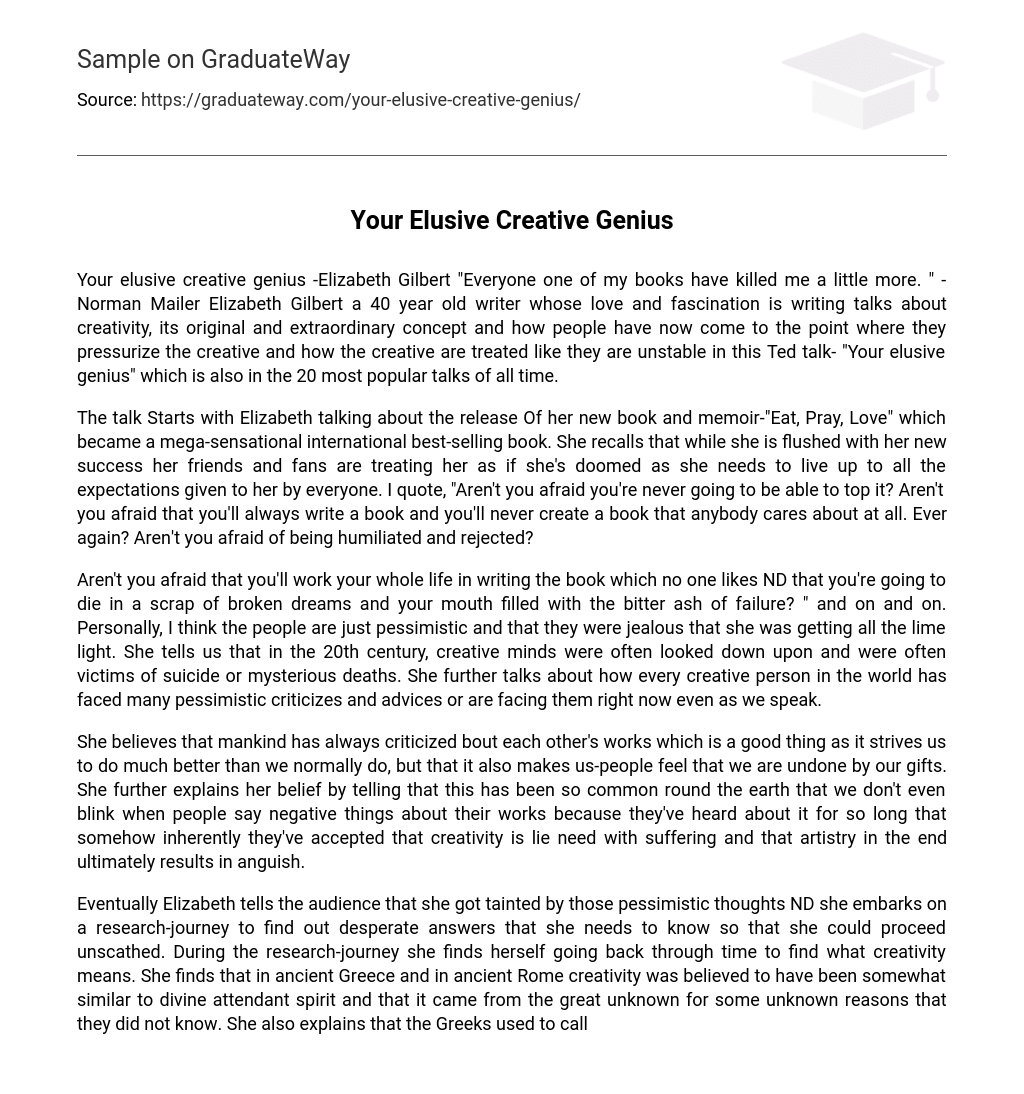Your elusive creative genius -Elizabeth Gilbert “Everyone one of my books have killed me a little more. ” -Norman Mailer Elizabeth Gilbert a 40 year old writer whose love and fascination is writing talks about creativity, its original and extraordinary concept and how people have now come to the point where they pressurize the creative and how the creative are treated like they are unstable in this Ted talk- “Your elusive genius” which is also in the 20 most popular talks of all time.
The talk Starts with Elizabeth talking about the release Of her new book and memoir-“Eat, Pray, Love” which became a mega-sensational international best-selling book. She recalls that while she is flushed with her new success her friends and fans are treating her as if she’s doomed as she needs to live up to all the expectations given to her by everyone. I quote, “Aren’t you afraid you’re never going to be able to top it? Aren’t you afraid that you’ll always write a book and you’ll never create a book that anybody cares about at all. Ever again? Aren’t you afraid of being humiliated and rejected?
Aren’t you afraid that you’ll work your whole life in writing the book which no one likes ND that you’re going to die in a scrap of broken dreams and your mouth filled with the bitter ash of failure? ” and on and on. Personally, I think the people are just pessimistic and that they were jealous that she was getting all the lime light. She tells us that in the 20th century, creative minds were often looked down upon and were often victims of suicide or mysterious deaths. She further talks about how every creative person in the world has faced many pessimistic criticizes and advices or are facing them right now even as we speak.
She believes that mankind has always criticized bout each other’s works which is a good thing as it strives us to do much better than we normally do, but that it also makes us-people feel that we are undone by our gifts. She further explains her belief by telling that this has been so common round the earth that we don’t even blink when people say negative things about their works because they’ve heard about it for so long that somehow inherently they’ve accepted that creativity is lie need with suffering and that artistry in the end ultimately results in anguish.
Eventually Elizabeth tells the audience that she got tainted by those pessimistic thoughts ND she embarks on a research-journey to find out desperate answers that she needs to know so that she could proceed unscathed. During the research-journey she finds herself going back through time to find what creativity means. She finds that in ancient Greece and in ancient Rome creativity was believed to have been somewhat similar to divine attendant spirit and that it came from the great unknown for some unknown reasons that they did not know. She also explains that the Greeks used to call creativity ‘daemons’ while the Romans called it ‘genius’.
She agrees with the Roman version of creativity because they think ‘genius’ is not a particularly clever individual but a divine attendant spirit. Which is great she tells us as it eases some of the pressure we feel while doing our work and when our work is not a success it just means that we can blame someone as we did our job but they did not fulfill their end of the bargain-in this case ‘our own personal genius’! At this I was practically listening to everything she said and soaking it all up like a sponge as I could relate to some parts of it-mostly the part where we get pressurized.
She explains that the ancient Greeks and Romans ancient belief that creativity came from the great unknown for some unknown reasons that they did not know was so great that Socrates, one of the most famous philosophers of all time used to say that he had his own personal ‘daemon’ whispering in his ears from far away. She also supports her research with: 1. Ruth Stone a poet who explains her creativity/inspiration as a thunderous train of air around the landscape and she’d be running to her house to get the paper and pencil, but sometimes she’d be late and she would miss it…..
The great chance to write a poem….. 2. Tom Waits a musician who tells how his life changed. When he was driving his car, he hears a small fragment of music and it was very warm, heart-touching and inspirational and he wants it but he has no paper and pencil. So, he tells it, “Can you not see I’m driving? ” “Do look like I can write a song right now? ” “layoff want to exist come back at a more opportune moment when I can take care of you. Otherwise go bother someone else. Go brother Leonard Cohen. ” At this Tom releases all his anxieties and his genius and then he becomes happier and care free after it.





